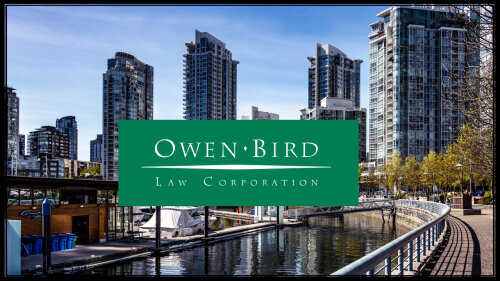Best Restructuring & Insolvency Lawyers in Vancouver
Share your needs with us, get contacted by law firms.
Free. Takes 2 min.
List of the best lawyers in Vancouver, Canada
About Restructuring & Insolvency Law in Vancouver, Canada
Restructuring and insolvency law in Vancouver, Canada, is designed to help individuals and businesses that are facing financial difficulties. This area of law covers both the legal procedures for reorganizing finances (restructuring) and dealing with situations where debts cannot be repaid (insolvency). In Vancouver, these processes are governed by federal laws like the Bankruptcy and Insolvency Act, as well as provincial regulations. Common solutions under this area of law include bankruptcy, proposals to creditors, receiverships, and corporate restructurings. The goal is to provide fair treatment for both debtors and creditors, while supporting the financial recovery or orderly exit of businesses and individuals in distress.
Why You May Need a Lawyer
There are several situations where seeking help from a restructuring and insolvency lawyer in Vancouver may be necessary. If you are a business facing cash flow problems, a creditor seeking to recover debts, or an individual who is unable to meet your financial obligations, legal advice can be crucial. Lawyers can help navigate complex processes such as bankruptcy filings, negotiating with creditors, preparing proposals, defending against lawsuits from creditors, and ensuring compliance with all legal requirements. In some cases, you may also need a legal expert to explore alternatives to bankruptcy, protect your assets, or challenge actions taken by other parties. Every situation is unique and a lawyer can help you understand your options and the potential impacts of each route.
Local Laws Overview
Restructuring and insolvency in Vancouver are primarily governed by federal legislation, most notably the Bankruptcy and Insolvency Act and the Companies’ Creditors Arrangement Act. The province of British Columbia also has statutes and court procedures that impact these matters, especially in issues relating to the appointment of receivers, property rights, and enforcement of judgments. Key aspects include mandatory trustee involvement for bankruptcies, requirements for fair notice to creditors, court oversight of major decisions, and special considerations for secured creditors. The laws encourage restructuring when possible and treat insolvency as a last resort. Local rules also provide certain protections for personal property, limit garnishments, and ensure certain debts cannot be written off in bankruptcy.
Frequently Asked Questions
What is the difference between restructuring and insolvency?
Restructuring involves reorganizing debts and business operations to return to financial health before becoming insolvent. Insolvency occurs when an individual or company is unable to pay debts as they become due.
Can I avoid bankruptcy if I am in financial trouble?
Yes, there are alternatives to bankruptcy such as making a proposal to creditors, negotiating informal arrangements, or undergoing corporate restructuring. A lawyer can help you explore these options.
What happens to my assets if I declare bankruptcy?
Some of your assets may be sold by a Licensed Insolvency Trustee to pay creditors. However, certain personal belongings and protected assets, like basic household goods or tools of your trade, may be exempt under provincial law.
How long does bankruptcy last in Vancouver?
For first-time bankruptcies, discharge may occur after nine months, but it can be longer if you have surplus income or repeat bankruptcies. The exact period varies based on your circumstances.
Will bankruptcy affect my credit rating?
Yes, bankruptcy will remain on your credit report for several years after discharge and can make it harder to obtain credit in the future. The exact duration depends on reporting agencies and whether it is your first or subsequent bankruptcy.
Is my student loan included in bankruptcy?
Student loans are only dischargeable if you have been out of school for seven years or more. If your last study date is more recent, you may still be responsible for these debts.
What is a Licensed Insolvency Trustee?
A Licensed Insolvency Trustee is a federally regulated professional authorized to manage bankruptcy and proposal proceedings. They act as an impartial intermediary between debtors and creditors.
Can a creditor garnish my wages in Vancouver?
Creditors can only garnish your wages after obtaining a court judgment and following the appropriate procedures. Some income and assets are protected under provincial exemptions.
What does corporate restructuring involve?
Corporate restructuring can involve renegotiating debt terms, selling assets, changing ownership structures, or other measures to improve a business’s financial position and avoid insolvency.
Do I need a lawyer or can I handle insolvency myself?
While you can start the process yourself by working with a Licensed Insolvency Trustee, a lawyer is crucial for complex situations, legal challenges, or to ensure your interests are protected throughout the process.
Additional Resources
For those seeking more information or support for restructuring and insolvency in Vancouver, consider the following resources:
- Office of the Superintendent of Bankruptcy Canada - Regulates bankruptcy and insolvency professionals and provides publicly accessible information.
- Licensed Insolvency Trustees - Licensed professionals who administer bankruptcies and proposals. They can provide initial consultations without charge.
- Courts of British Columbia - Provincial courts oversee bankruptcy and insolvency proceedings. Their websites and staff can provide procedural information.
- Consumer Protection BC - Offers information for individuals on debt collection and consumer rights.
- Various non-profit credit counselling agencies in Vancouver that offer financial advice and alternatives to bankruptcy.
Next Steps
If you are considering restructuring or insolvency proceedings in Vancouver, your next steps should include contacting a qualified professional. Start by gathering all relevant financial documents, including statements of assets and debts, recent tax returns, and any correspondence from creditors. Consider booking a consultation with a restructuring and insolvency lawyer to receive tailored advice based on your specific situation. You may also arrange an appointment with a Licensed Insolvency Trustee for further guidance. In all cases, prompt action provides the best chance to preserve your options and protect your interests. If you feel overwhelmed, remember you are not alone, and there are experienced professionals ready to help you navigate the process with confidence.
Lawzana helps you find the best lawyers and law firms in Vancouver through a curated and pre-screened list of qualified legal professionals. Our platform offers rankings and detailed profiles of attorneys and law firms, allowing you to compare based on practice areas, including Restructuring & Insolvency, experience, and client feedback.
Each profile includes a description of the firm's areas of practice, client reviews, team members and partners, year of establishment, spoken languages, office locations, contact information, social media presence, and any published articles or resources. Most firms on our platform speak English and are experienced in both local and international legal matters.
Get a quote from top-rated law firms in Vancouver, Canada — quickly, securely, and without unnecessary hassle.
Disclaimer:
The information provided on this page is for general informational purposes only and does not constitute legal advice. While we strive to ensure the accuracy and relevance of the content, legal information may change over time, and interpretations of the law can vary. You should always consult with a qualified legal professional for advice specific to your situation.
We disclaim all liability for actions taken or not taken based on the content of this page. If you believe any information is incorrect or outdated, please contact us, and we will review and update it where appropriate.















